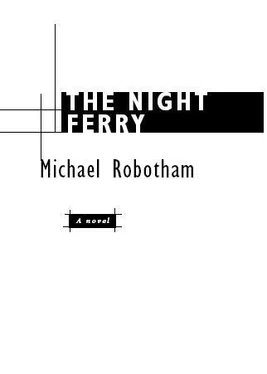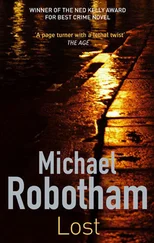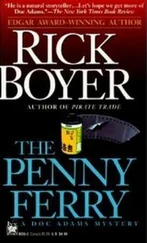Dave hasn’t said much since I introduced them to each other, but now he mentions the sailing school he wants to buy. Soon they’re discussing skiffs and sail area. I can actually picture Dave in an Aran sweater, ducking beneath a boom. He seems suited to outdoors, big spaces full of wind and sky and water.
Five hundred yards ahead of us is a container ship. The Port of Amsterdam spent millions thinking they could match Rotterdam as a hub for international trade, explains Spijker. “It is never going to be so.”
Passing the ship, we come to a wooden pier rising twenty feet above the waterline supported by pylons and beams. A floating platform is moored on the nearside.
Spijker disengages the throttle and the engine idles. He steadies the Zodiac and throws a rope around a rusting cleat on the platform, drawing us closer. At the same moment a spotlight is switched on and swings into the darker shadows beneath the pier, searching amid the weathered gray wood. A flash of white appears. A figure suspended above the water, gazing down at me. A noose is looped around her neck. Another rope around her waist disappears into the water, obviously weighted down.
The body swings slightly as if moved by an unseen hand and her outstretched toes seem to pirouette on the surface of the water.
“Is it the deaf girl?” asks Spijker.
Zala’s eyes are open. Two crimson orbs. Blood vessels have burst in the whites and her pupils seem to have disappeared. She’s dressed in the same skirt and pink jacket that I last saw her wearing. Salt in the air has stiffened the fabric.
The Zodiac is rising and sinking on the slight swell. Spijker steadies it and I step onto the platform. A metal ladder, bolted to a pylon, leads up to the pier. Seagulls watch from the navigation buoys and a nearby barge. The other Zodiac has arrived, carrying ropes and a stretcher cage.
Spijker climbs the ladder and I follow him. Dave is behind me. The planks of the pier are old and deeply furrowed, with gaps in between that are wide enough for me to see the top of Zala’s head and her shoulders.
The rope around her neck is tied to a metal bollard normally used for mooring ships.
A police officer in climbing gear abseils over the side. He swings in a harness beside her body and we watch in silence as Zala is lashed into a stretcher cage. The rope around her waist is tied to a cinder block. I can see the cement dust on her hands and the front of her jacket.
They made her jump. The certainty is like a vision. She held the cinder block in her arms and they pushed her the final step. She dropped fifteen feet before the rope stopped her. The cement brick tore from her fingers and kept falling until the second rope, tied around her waist, pulled taut. My stomach shares the drop.
“A fisherman found her just before nine thirty,” says Spijker. “He reported it to the coast guard.” He swivels to a junior officer, seeking confirmation.
“What made you think…?” I can’t finish the question.
“She fitted the description.”
“How did she get out here?”
Spijker motions along the pier. “It’s fenced off. Warning signs. Of course, that only encourages people.”
“You’re not thinking suicide?”
“Your deaf girl didn’t carry that lump of concrete out here by herself.”
In the distance there are whitecaps where the water is less sheltered from the wind. A fishing boat is coming in, its windows flashing in a rare shaft of sunlight.
Despite his veteran’s cynicism, Spijker needs to show compassion and offer condolences. Somehow I have become his only link to this girl.
“She came from Kabul. She was an orphan,” I explain.
“Another one.”
“What do you mean?”
“The list of surrogates from the IVF clinic. At least ten of them were orphans. It’s making them difficult to find.”
Orphans. Illegal immigrants. What a perfect combination of the unwanted and the desperate.
“Samira mentioned a visitor to the orphanage. A westerner who said he could organize a job for her. He had a cross on his neck. I might know who it is.” I give him Donavon’s name and he promises to check the files.
The dock gates have been unlocked at the far end of the pier. A forensic team arrives in a van. A second car is summoned to take us back to our hotel.
As I walk along the pier I feel that Amsterdam has changed and become darker and more dangerous. I long for the familiar. Home.
Dave falls into step beside me.
“Are you all right?”
“Fine.”
“It’s not your fault.”
“What do you know about it?” I snap. Straightaway, I feel angry with myself. He’s done nothing wrong. After a few minutes I try to assuage my guilt. “Thanks for being here. I’m sorry about last night. Forget everything I said.”
“I think we should talk about it some more.”
“There’s nothing to talk about.”
“I love you.”
“But it’s different now, isn’t it?”
Dave puts his hand on my forearm to stop me. “I don’t care. I want to be with you.”
“You say that now, but think about in five years or ten years. I couldn’t do that to you.”
An abandoned crane is rusting on the shoreline. It looks like wreckage from an ancient war. Zala’s body is still spinning in my mind, pirouetting on her toes in the waves.
I have been a fool. My good intentions have set off a chain of events that have led to this. And I don’t know where it ends or who else will be hurt. I am certain of only one thing: I want to spend every waking moment hunting down the people who took Cate from me and who did this to Zala. This is not about an eye for an eye. It’s bigger than that. I want to make their misery more poignant and horrific than anything they have inflicted upon others. Never in my life have I felt so capable of killing someone.
Dave’s hair is combed. His bag is packed. A taxi is booked for the airport. The clock hasn’t moved. Not even a second. I swear it. I hate the last hour before someone leaves. Everything has been said and done. Minutes drag out. Statements are repeated. Tickets are checked.
“It’s time to leave this alone,” says Dave, rinsing his toothbrush. “It’s over.”
“How did we get to over?”
“Maybe you think,” he says, choosing his words with care, “that this is about you and me. It’s not. I’d tell you the same thing if I didn’t love you.”
“But that’s why you should understand.”
He picks up his bag and puts it down again.
“You could come with me.”
“I’m not leaving Ruiz.”
He puts on his jacket.
“You could stay,” I suggest.
“I have to give evidence in court.”
“I need you.”
“You don’t need anyone.”
It’s not meant to wound but I flinch as though struck.
He opens the door slowly. All the while I’m hoping he’ll turn back, take me in his arms, force me to look in his eyes, tell me he doesn’t care about anything except me, that he understands.
The door closes behind him. My chest is suddenly empty. He’s taken my heart.
For twenty minutes I stare at the door, wishing it would open, hoping that he’ll come back.
When I was lying in hospital with my damaged spine, fearing I would never walk again, I started to say cruel things to people. I criticized nurses and complained about the food. I called one male orderly Fat Albert after the Bill Cosby character.
“New Boy” Dave came to visit me every day. I remember screaming at him and calling him a moron. He didn’t deserve it. I felt sorry for myself because everybody else felt sorry for me. And being cruel to people took my mind off myself for a while.
Dave didn’t come to see me after that. I wanted to call him. I wanted to say I was sorry for being mad and could he please come back. I didn’t. Instead I wrote him a letter. What a gutless wonder! I don’t deserve him.
Читать дальше












